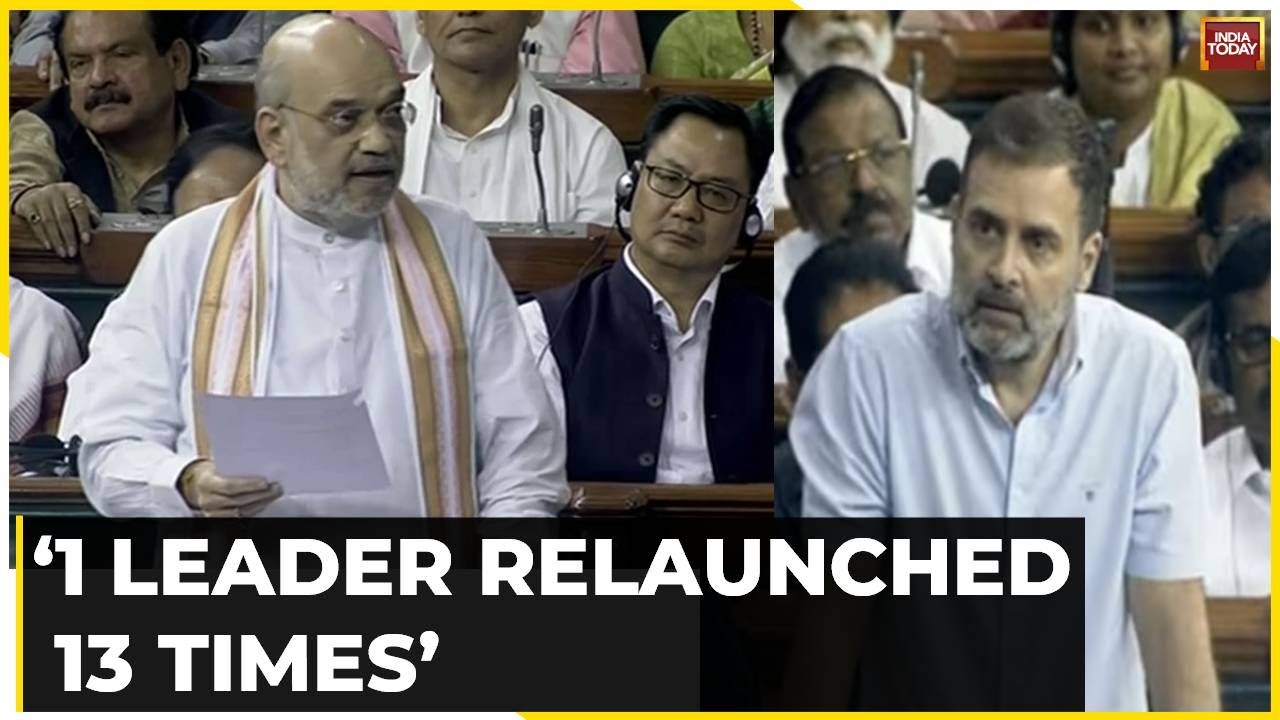


During a debate in the Rajya Sabha, Union Home Minister Amit Shah responded to Congress leader Rahul Gandhi's accusations that the BJP wants to change the Constitution by highlighting Congress' own history of amending the Constitution for political gain. He also criticized Rahul Gandhi for claiming to represent youth while being in his 50s. Shah's statements come after the introduction of a bill to hold simultaneous Lok Sabha and assembly elections, which faced opposition from Congress and other opposition leaders.
Amit Shah's Response to Rahul Gandhi's Accusations in Rajya Sabha: A Heated Debate
In a recent debate in the Rajya Sabha, Union Home Minister Amit Shah engaged in a heated exchange with Congress leader Rahul Gandhi over the BJP's alleged intentions to amend the Constitution.
Background
The debate arose from a bill introduced by the government to hold simultaneous Lok Sabha and assembly elections. This proposal was met with opposition from the Congress and other opposition parties.
Rahul Gandhi's Accusations
Rahul Gandhi accused the BJP of wanting to change the Constitution for political gain. He alleged that the ruling party was planning to "rewrite" the Constitution to suit its own agenda.
Amit Shah's Response
Home Minister Amit Shah responded to Gandhi's accusations by highlighting Congress' own history of amending the Constitution. He pointed out that the Congress had amended the Constitution 104 times, many of them for political reasons.
Shah further criticized Gandhi for claiming to represent youth while being in his 50s. He questioned Gandhi's credibility on matters related to constitutional amendments and political processes.
Opposition's Concerns
Opposition leaders, including Gandhi, raised concerns that holding simultaneous elections would give the ruling party an unfair advantage. They argued that the government could use its control over resources and media to influence the outcome of elections.
Government's Stance
The government maintained that simultaneous elections would reduce election-related expenses and promote development. However, they were open to considering amendments to the bill to address concerns raised by the opposition.
Top 5 FAQs and Answers
They clashed over allegations that the BJP wants to change the Constitution, with Shah highlighting Congress' own amendments and Gandhi questioning BJP's motives.
Concerns include the potential for the ruling party to influence elections, the reduced frequency of elections, and the financial burden on political parties.
The Indian Constitution has been amended 104 times, including significant amendments by both Congress and BJP-led governments.
The government believes that simultaneous elections would reduce election expenses, promote development, and eliminate the disruption caused by frequent polls.
The bill is currently under consideration by a parliamentary committee. The government is open to considering amendments to the bill to address opposition concerns.

During a speech for Deepotsav 2025 celebrations in Ayodhya, Uttar Pradesh Chief Minister Yogi Adityanath criticized the opposition for denying Lord Ram's existence and obstructing the Ram Janmabhoomi Temple movement. He specifically called out the Congress for submitting an affidavit to the Supreme Court calling Lord Ram a myth and accused the Samajwadi Party of firing bullets at Ram devotees. Adityanath also emphasized the determination and resilience of the movement, which began in 1949 with the resolution "Ram Lalla Hum aayenge, Mandir wahin banayenge" and continues to this day.

Activists and advocacy groups staged massive demonstrations across the country in response to what they see as President Trump's abuse of power. With signs protesting policies such as mass deportations and the federal government shutdown, protestors showed a fierce love for their country. Though there were no reports of violence or arrests, Republicans labeled the demonstrations as "hate America" rallies. Organizers estimate that nearly 7 million people participated in over 2,700 cities and towns throughout the U.S., making it one of the largest reported one-day protests in American history.

With the 2025 Assembly Elections in Bihar on the horizon, the state's Araria constituency is gearing up for an intense revision of its electoral roll. This decision by the Election Commission aims to ensure that all eligible citizens are registered to vote in the upcoming elections. In the last election, the Congress emerged victorious in the constituency, but with no candidates declared yet, all eyes are on the official schedule for the 2025 Bihar Assembly Elections.

The Bharatiya Janata Party (BJP) in Andhra Pradesh marked Dhanvantari Jayanti with a colorful rally and speeches highlighting social inclusion, cultural heritage, and development. Leading state and district leaders, including BJP State president PVN Madhav, addressed the gathering and emphasized the party's commitment to equal respect for all religions and welfare initiatives for marginalized groups. At another event, Telangana BJP president Ramachandra Rao endorsed a proposed reservation for backward classes in Telangana and criticized the Congress and other parties for corruption while touting BJP's claim of clean governance.

Defence Minister Rajnath Singh, while flagging off the first batch of BrahMos missiles in Lucknow, warned Pakistan that their entire territory is now within range of India's powerful missiles. Singh also highlighted the success of Operation Sindoor, stating that it was just a glimpse of India's growing capabilities. The minister emphasized that BrahMos serves as a symbol of India's strategic confidence and is a key pillar of the country's defence forces.

Crowds gathered in various cities across the US and overseas today for the No Kings rallies, organized to protest against President Trump's administration and to defend First Amendment rights. From Los Angeles and New York to Chicago, Washington D.C, and Austin, Texas, protesters marched and chanted, carrying homemade signs with messages such as "We want all of the government to work" and "Make America Good Again." Despite the festive atmosphere, the message was serious as speakers called for the protection of Constitutional rights, which they feel are being threatened by the current administration.

After issuing directions earlier this year to expedite the disposal of execution petitions, the Supreme Court has expressed disappointment over the fact that more than 8.8 lakh such petitions are still pending across the country. Despite disposing of 3.38 lakh petitions since March, the Court notes that the backlog is still concerning. It warns that delay in executing decrees could result in travesty of justice and directs the Karnataka High Court to provide an explanation for not submitting data on pending cases.

With election results just around the corner, the Union Home Minister has reiterated the BJP's respect for its alliance partners. The decision on forming a government in light of the election outcome will be based on the results and mutually agreed upon by all parties involved. Stay updated with News24 for the latest developments in the political sphere.

In a surprise move, President Donald Trump has commuted the sentence of former U.S. Representative George Santos, who was serving a seven-year prison term for fraud and identity theft. Santos, a New York Republican, admitted to deceiving donors and stealing the identities of 11 people, including family members, to fund his campaign. The decision was announced by Trump on social media, spurring strong reactions from both supporters and critics.

In a significant development, Defence Minister Rajnath Singh inaugurated Hindustan Aeronautics Limited's third production line for the LCA Tejas Mk1A and also witnessed the aircraft's successful maiden flight in Nashik. The event also marked the inauguration of HAL's second production line for the Hindustan Turbo Trainer-40 (HTT-40). With the approval of the purchase of 97 LCA Mark 1A fighter jets, the need for new inductions has been underlined by IAF chief AP Singh, while HAL officials remain confident in meeting this requirement.